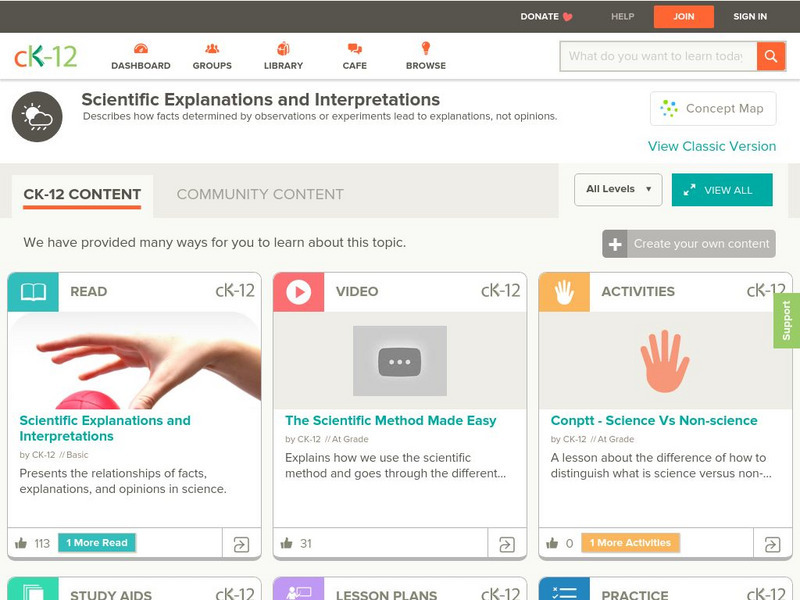Hi, what do you want to do?
Curated OER
Students as Historians: Investigating the Gulf War
Sixth graders investigate the Gulf War using primary and secondary sources. Students research using a variety of sources including the internet.
Curated OER
Connecticut Folklore: Fact or Fiction
Sixth graders read legends to learn the history of Connecticut in a fun informative way.
York University
Classics in History of Psychology: Cognitive Consequences of Forced Compliance
This page is a part of the Classics in the History of Psychology site. First published in 1959 this paper looks at what happens to a person's private opinion when he/she is forced to do or say something contrary to that opinion.
Other
Debate Central: Learn About Debating
This web site has debate information on how to debate, how to judge, how to coach, how to be a better speaker and how to research.
CK-12 Foundation
Ck 12: Scientific Explanations and Interpretations
[Free Registration/Login may be required to access all resource tools.] Students learn about scientific explanations and interpretations through instructional videos, grade-level texts, interactive activities, and quick assessments.
Texas Education Agency
Texas Gateway: Differentiate Substantiated and Unsubstantiated Opinions in Text
[Accessible by TX Educators. Free Registration/Login Required] In this lesson, students will learn to differentiate fact from opinion and to decide whether an opinion is substantiated or not.
Texas Education Agency
Texas Gateway: Distinguish Between Summary and Critique (English I Reading)
In this lesson, students will learn how to write an effective summary using reading strategies to help ensure that the summary contains enough information without including unnecessary details or personal opinions. You will also learn...
Texas Education Agency
Texas Gateway: Distinguish Between Summary and Critique (English Ii Reading)
This lesson will focus on summary and critique separately so that you can distinguish between the two. You will learn how to summarize a text and how to distinguish between essential and nonessential information when summarizing. You...
Polk Brothers Foundation Center for Urban Education at DePaul University
De Paul University: Center for Urban Education: I Can Classify Facts and Opinions [Pdf]
A T-Chart is provided for students to use as they classify facts and opinions. Students will explain how to determine facts and opinions after completing the T-Chart.
ReadWriteThink
Read Write Think: Considering a Feminist Perspective
This lesson plan explores issues surrounding understanding perspective and the power of opinion. Included in the lesson plan is an overview, practice, objectives, resources, preparation, and more.
Sophia Learning
Sophia: Supporting Details Explained
This slideshow focuses on supporting details; it discusses their purpose, the audience, and the point to be made. It lists the five most common types of supporting details: facts, statistics, opinions, examples, and personal observations...
SMART Technologies
Smart: Fact vs. Opinion
In this activity provided by SMART, students will learn and practice separating fact from opinion.
Other
Great Thinkers and Visionaries: Books by Albert Einstein
This site has a comprehensive listing of over 50 books written by Einstein. Each has a link to Amazon, listing availability, cost, short synopsis.
Other
Theory Into Practice: Cognitive Dissonance
This site from the Theory Into Practice website provides a simple and straitforward explaination of the Cognitive Dissonance theory. The page gives a good example of the theory in action and references for further information.













![De Paul University: Center for Urban Education: I Can Classify Facts and Opinions [Pdf] Graphic De Paul University: Center for Urban Education: I Can Classify Facts and Opinions [Pdf] Graphic](https://static.lp.lexp.cloud/images/attachment_defaults/resource/large/FPO-knovation.png)


